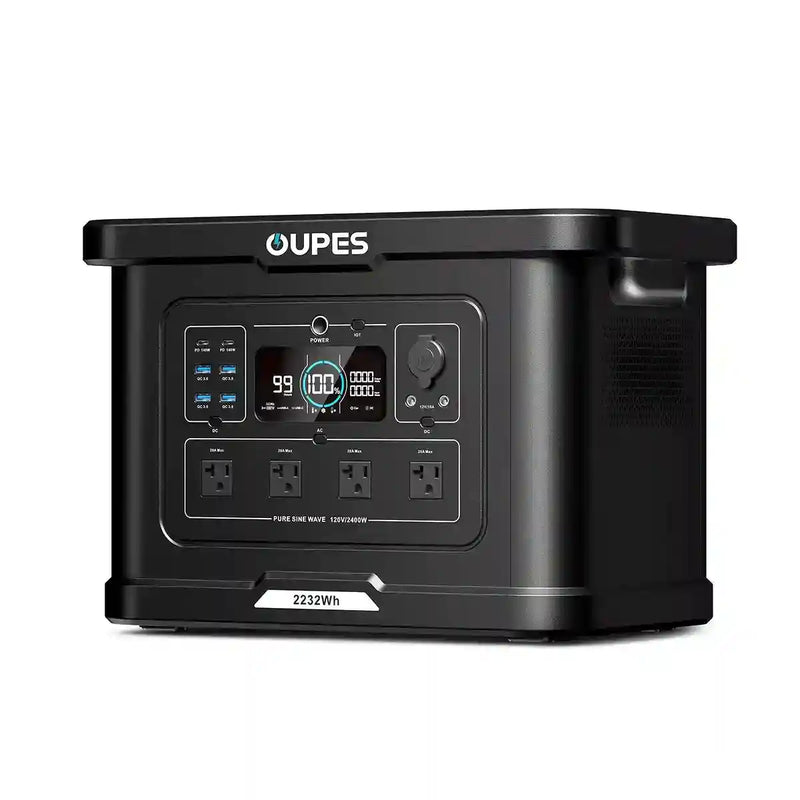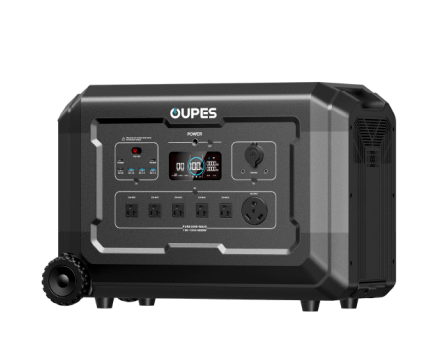
Power outages can happen unexpectedly, leaving essential appliances like refrigerators without electricity. Understanding how long a portable power station can keep your refrigerator running is crucial for maintaining food safety and minimizing waste. With proper planning, you can ensure your household remains functional and comfortable during these interruptions.
This article explores the factors that affect the runtime of refrigerators on portable power stations. From energy requirements and battery capacity to usage tips and safety considerations, you??ll gain the knowledge needed to make informed decisions and select the right backup solution. Incorporating a reliable power station like OUPES ensures your refrigerator stays operational during emergencies.
Understanding Refrigerator Power Consumption
Before estimating how long a portable power station can run a refrigerator, it??s essential to understand the appliance??s energy requirements. Refrigerators typically consume between 100 and 800 watts depending on size, efficiency, and model. Larger units or older models tend to require more power, while energy-efficient models consume less.
The energy consumption is not constant; refrigerators cycle on and off. During the compressor??s operation, energy draw peaks, while during idle phases, consumption drops significantly. Understanding this pattern helps in estimating the runtime more accurately when using a portable power station.
Portable power stations provide a steady source of electricity, but matching the fridge??s peak wattage with the station??s output is critical. Some power stations have surge capacity to handle short-term spikes, while others are limited to continuous output. Calculating the average energy consumption, taking into account the compressor cycles, allows you to determine the appropriate capacity for your backup solution.
Other factors, such as ambient temperature, frequency of door openings, and the fridge??s content, can also affect energy use. A fridge operating in a hot environment or opened frequently will consume more energy, reducing the duration a portable power station can maintain its operation. Being aware of these variables helps in planning for effective refrigeration during power outages.
Choosing the Right Portable Power Station
Selecting a portable power station capable of running a refrigerator requires attention to capacity, output wattage, and efficiency. The battery capacity, usually measured in watt-hours (Wh), directly determines how long a fridge can operate. For example, a 1,000Wh power station can theoretically power a 100W refrigerator for about 10 hours under ideal conditions.
Output wattage is equally important. The power station must supply enough energy to handle the refrigerator??s startup surge, which can be two to three times the running wattage. Devices like OUPES portable power stations are designed to provide both continuous and surge power, ensuring the refrigerator starts reliably and continues running.
Recharge options also impact usability during extended outages. Solar charging or the ability to connect multiple units can extend runtime, making the system more versatile. Evaluate your household??s energy needs and the duration of likely power outages to select a power station that offers sufficient capacity and flexibility for uninterrupted refrigerator operation.
Considering factors such as portability, battery type, and safety features is essential. Lithium-ion batteries offer longer lifespan and lighter weight compared to lead-acid alternatives, while built-in safety protections prevent overloading or short circuits. Choosing the right unit ensures peace of mind and reliable performance during emergencies.
Optimizing Refrigerator Usage with a Power Station
Maximizing the runtime of a refrigerator on a portable power station requires strategic usage. Keeping the refrigerator door closed as much as possible reduces energy consumption, maintaining a stable internal temperature and extending battery life. Pre-cooling the fridge before an outage can also help maintain cold conditions longer.
Organize contents efficiently to minimize the number of times the door is opened. Store frequently used items near the top or front to avoid searching through the fridge. Using ice packs or insulated containers can help maintain temperature for specific foods, reducing the fridge??s workload and conserving power.
Some refrigerators allow adjusting temperature settings. Setting the fridge to a slightly warmer temperature, while still safe for food, can reduce energy demand. Unplugging other non-essential appliances from the power station ensures maximum energy is directed to the refrigerator. Monitoring battery levels regularly helps anticipate when recharging may be needed, avoiding unexpected food spoilage.
By implementing these practical measures, a portable power station can run a refrigerator more efficiently, extending runtime and reducing stress during power outages. Combining thoughtful organization and proper device management ensures reliable refrigeration for essential food and beverages.
Factors Affecting Runtime and Efficiency
The runtime of a refrigerator on a portable power station depends on multiple factors beyond battery capacity and fridge wattage. Ambient temperature plays a major role; refrigerators in hot environments consume more energy, shortening the backup duration. Conversely, cooler surroundings reduce power demand and extend runtime.
Refrigerator size, age, and insulation quality influence energy efficiency. Older units or those with damaged seals require more power to maintain temperature. Additionally, the type of contents, whether full or partially empty, affects energy use. A well-stocked fridge retains cold air better, reducing the compressor??s operating time.
Power station efficiency also matters. Energy loss occurs during conversion from battery DC power to AC, typically around 10-15%. Using highly efficient inverters and devices designed for low-loss operation ensures more runtime for your refrigerator. Regular maintenance of both the fridge and the power station, such as checking seals and cleaning coils, contributes to optimal performance and energy conservation.
Understanding these variables helps users plan effectively, ensuring the portable power station provides reliable refrigeration for as long as possible during outages or off-grid situations.
Practical Tips for Long-Term Use
In prolonged outages, maintaining refrigerator operation requires careful planning and supplementary strategies. Consider using multiple portable power stations or solar charging solutions to extend runtime. OUPES units, combined with foldable solar panels, allow continuous operation during multi-day power interruptions.
Rotate food items between insulated coolers and the fridge to balance energy use. Keep essential items chilled in the fridge while storing less critical items in insulated containers. Use power-saving techniques such as reducing fridge temperature only when necessary, minimizing door openings, and strategically placing ice packs for maximum effect.
Regularly check and maintain the power station, ensuring batteries are properly charged and connections are secure. Be aware of potential safety hazards, including overloading circuits or using incompatible devices. Properly managed, a portable power station can provide reliable refrigeration for extended periods, safeguarding food and maintaining household functionality.
In conclusion, understanding refrigerator power requirements, selecting the right portable power station, optimizing usage, and considering environmental factors ensures your refrigerator can remain operational during power outages. OUPES portable power stations offer reliable, renewable energy solutions to keep essential appliances running safely and efficiently.
With careful planning and implementation, you can maintain food safety and household comfort even during extended outages. By choosing appropriate backup solutions, monitoring energy usage, and employing efficiency strategies, portable power stations become invaluable tools for emergency preparedness.
Maintaining a functional refrigerator during power interruptions reduces stress, preserves food, and ensures your household remains resilient. Investing in high-quality, reliable power solutions like OUPES allows you to face unexpected power loss with confidence and peace of mind.




























